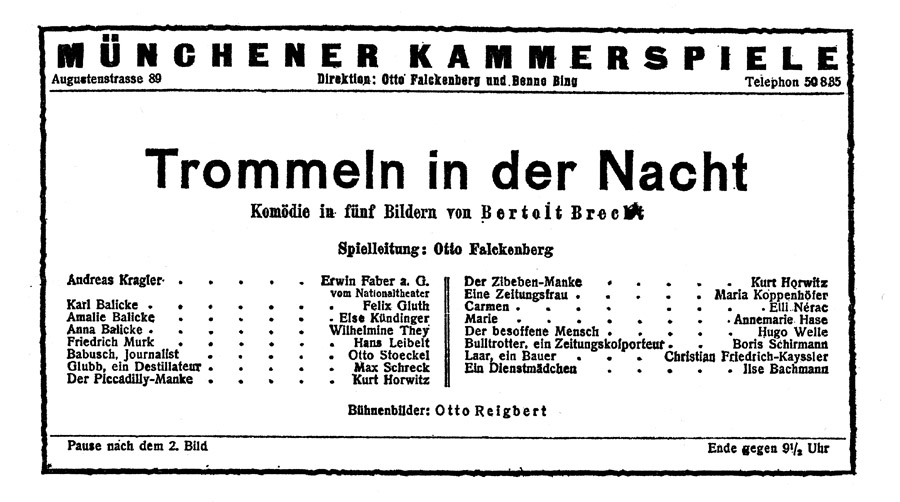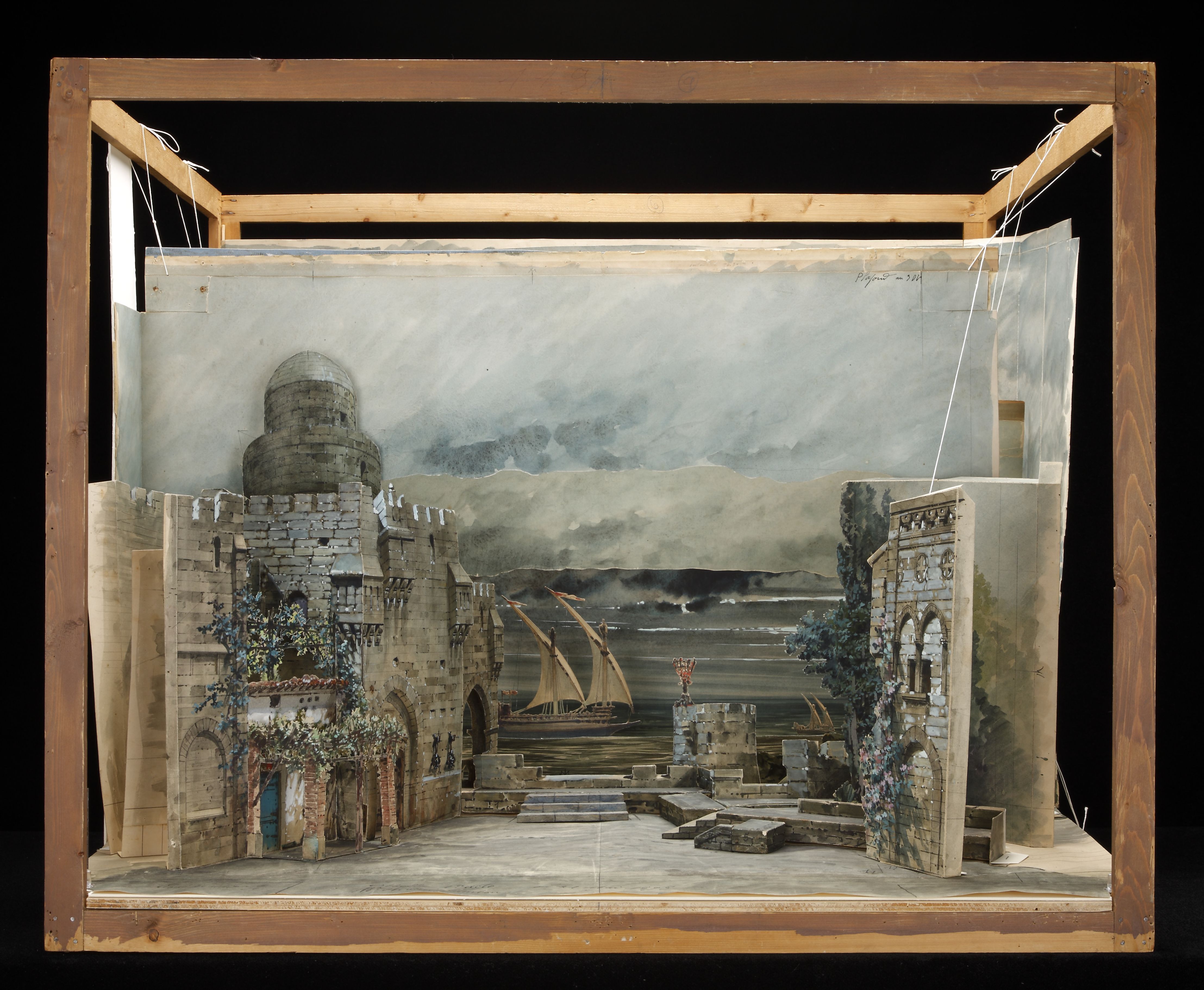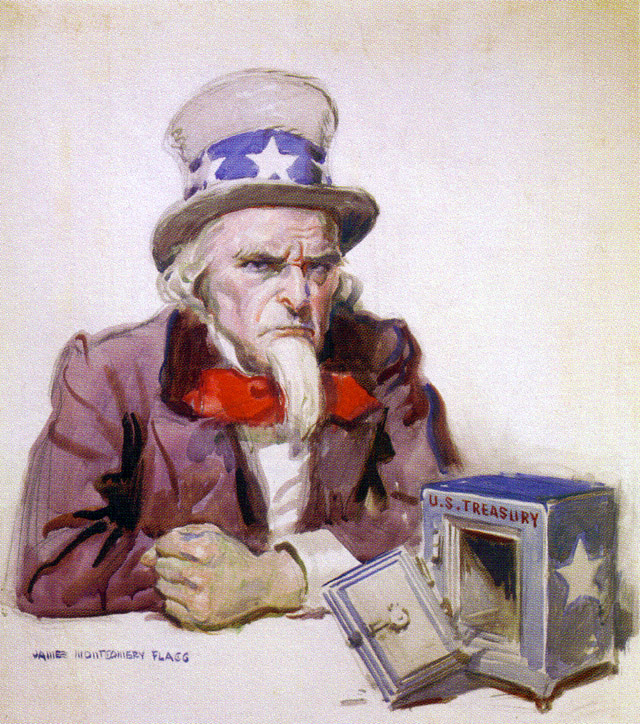|
Drums In The Night
''Drums in the Night'' (German language, German: ''Trommeln in der Nacht'') is a Play (theatre), play by the German playwright Bertolt Brecht. Brecht wrote it between 1919 and 1920, and it received its first theatrical production in 1922. It is in the Expressionism (theatre), Expressionist style of Ernst Toller and Georg Kaiser. The play—along with ''Baal (play), Baal'' and ''In The Jungle of Cities, In the Jungle''—won the Kleist Prize for 1922 (although it was widely assumed, perhaps because ''Drums'' was the only play of the three to have been produced at that point, that the prize had been awarded to ''Drums'' alone); the play was performed all over Germany as a result.Willett (1967, 23-24), Willett and Manheim (1970, viii-ix), and Meech (1994, 50). Brecht later claimed that he had only written it as a source of income.Willett and Manheim (1970, ix). ''Drums in the Night'' is one of Brecht's earliest plays, written before he became a Marxist, but already the importance of ... [...More Info...] [...Related Items...] OR: [Wikipedia] [Google] [Baidu] |
Bertolt Brecht
Eugen Berthold Friedrich Brecht (10 February 1898 – 14 August 1956), known as Bertolt Brecht and Bert Brecht, was a German theatre practitioner, playwright, and poet. Coming of age during the Weimar Republic, he had his first successes as a playwright in Munich and moved to Berlin in 1924, where he wrote ''The Threepenny Opera'' with Elisabeth Hauptmann and Kurt Weill and began a life-long collaboration with the composer Hanns Eisler. Immersed in Marxist thought during this period, Brecht wrote didactic ''Lehrstücke'' and became a leading theoretician of epic theatre (which he later preferred to call "dialectical theatre") and the . When the Nazi Party, Nazis came to power in Germany in 1933, Brecht fled his home country, initially to Scandinavia. During World War II he moved to Southern California where he established himself as a screenwriter, while also being surveilled by the FBI. In 1947, he was part of the first group of Hollywood film artists to be subpoenaed by the Ho ... [...More Info...] [...Related Items...] OR: [Wikipedia] [Google] [Baidu] |
Spartacist Uprising
The Spartacist uprising (German: ), also known as the January uprising () or, more rarely, Bloody Week, was an armed uprising that took place in Berlin from 5 to 12 January 1919. It occurred in connection with the German Revolution of 1918–1919, German revolution that broke out just before the end of World War I. The uprising was primarily a power struggle between the supporters of the provisional government led by Friedrich Ebert of the Majority Social Democratic Party of Germany (MSPD), which favored a social democracy, and those who backed the position of the Communist Party of Germany (KPD) led by Karl Liebknecht and Rosa Luxemburg, which wanted to set up a Soviet republic, council republic similar to the one established by the Bolsheviks in Russia. The government's forces were victorious in the fighting. The uprising began with mass demonstrations and strikes called by the parties of the radical left to protest the dismissal of Berlin's chief of police. Taken by sur ... [...More Info...] [...Related Items...] OR: [Wikipedia] [Google] [Baidu] |
Hans Leibelt
Hans Leibelt (11 March 1885 in Leipzig, German Empire – 3 December 1974 in Munich, West Germany) was a German film actor. Selected filmography * ''Heimliche Sünder'' (1926) * ''The False Prince (1927 film), The False Prince'' (1927) * ''The Man in Search of His Murderer'' (1931) as Adamowski * ''The Street Song'' (1931) as the inspector * ''The Captain from Köpenick (1931 film), The Captain from Köpenick'' (1931) as Man at the advertising column * ''You Don't Forget Such a Girl'' (1932) as Hahnen Sr. * ''Night Convoy'' (1932) * ''The Magic Top Hat'' (1932) as the stage director * ''Love at First Sight (1932 film), Love at First Sight'' (1932) as Count Prillwitz * ''Contest (1932 film), Contest'' (1932) as Brandt, Mercedes team manager * ''Morgenrot (film), Morgenrot'' (1933) as Bürgermeister von Meerskirchen * ''Financial Opportunists'' (1934) as Klagemann * ''Zimmermädchen... Dreimal klingeln'' (1934) as Otto Ruhland * ''The Girlfriend of a Big Man'' (1934) as Reider ... [...More Info...] [...Related Items...] OR: [Wikipedia] [Google] [Baidu] |
Max Schreck
Friedrich Gustav Maximilian Schreck Eickhoff, Stefan. 2007 (6 September 1879 – 20 February 1936), Walk, Ines. 2006. known professionally as Max Schreck, was a German actor, best known for his lead role as the vampire Count Orlok in the film '' Nosferatu'' (1922). Early life Max Schreck was born in Berlin-Friedenau, on 6 September 1879. Six years later, his father bought a house in the independent rural community of Friedenau, then part of the district of Teltow. He was baptized at St. Matthew's Church in Berlin. Schreck's father did not approve of his son's ever-growing enthusiasm for theatre. His mother provided the boy with money, which he secretly used for acting lessons, although only after the death of his father did he attend drama school. After graduating, he travelled briefly across the country with poet and dramatist Demetrius Schrutz. Schreck had engagements in Mulhouse, Meseritz, Speyer, Rudolstadt, Erfurt and Weissenfels, and his first extended stay at T ... [...More Info...] [...Related Items...] OR: [Wikipedia] [Google] [Baidu] |
Erwin Faber
Erwin Faber (21 July 1891 – 4 May 1989) was a leading actor in Munich and later throughout Germany, beginning after World War I, and through the late-1970s, when he was still performing at the Residenz Theatre (The National Theatre of Bavaria). Born in Innsbruck, Austria, Faber remained in Germany during the Third Reich, emerging afterwards as a prominent actor in the Federal Republic of Germany (West Germany). He died in Munich in 1989, only two months after his last performance at the Residenztheater (the National Theatre of Bavaria), at age 97. Acting career In addition to performing in dozens of dramas and films in Germany, working with the leading directors in post-World War I Germany, such as Max Reinhardt, Otto Falckenberg, and Erich Engel, Faber also was chosen by Bertolt Brecht to play the leads in the first three staged plays of Brecht in Munich, beginning with ''Drums in the Night'' (''Trommeln in der Nacht'') at the avant-garde theatre, the Munich Kammerspiele ... [...More Info...] [...Related Items...] OR: [Wikipedia] [Google] [Baidu] |
Otto Reigbert
Otto is a masculine German given name and a surname. It originates as an Old High German short form (variants ''Audo'', '' Odo'', '' Udo'') of Germanic names beginning in ''aud-'', an element meaning "wealth, prosperity". The name is recorded from the 7th century ( Odo, son of Uro, courtier of Sigebert III). It was the name of three 10th-century German kings, the first of whom was Otto I the Great, the first Holy Roman Emperor, founder of the Ottonian dynasty. The Gothic form of the prefix was ''auda-'' (as in e.g. '' Audaþius''), the Anglo-Saxon form was ''ead-'' (as in e.g. '' Eadmund''), and the Old Norse form was '' auð-''. Due to Otto von Bismarck, the given name ''Otto'' was strongly associated with the German Empire in the later 19th century. It was comparatively frequently given in the United States (presumably in German American families) during the 1880s to 1890s, remaining in the top 100 most popular masculine given names in the US throughout 1880–1898, but its ... [...More Info...] [...Related Items...] OR: [Wikipedia] [Google] [Baidu] |
Scenic Design
Scenic design, also known as stage design or set design, is the creation of scenery for theatrical productions including Play (theatre), plays and Musical theatre, musicals. The term can also be applied to film and television productions, where it may be referred to as Production designer, production design. Scenic designers create sets and scenery to support the overall artistic goals of the production. Scenic design is an aspect of scenography, which includes theatrical set design as well as light and sound. Modern scenic designers are increasingly taking on the role of co-creators in the artistic process, shaping not only the physical space of a production but also influencing its blocking, pacing, and tone. As Richard Foreman famously stated, scenic design is a way to "create the world through which you perceive things happening." These designers work closely with the director, playwright, and other creative members of the team to develop a visual concept that complements t ... [...More Info...] [...Related Items...] OR: [Wikipedia] [Google] [Baidu] |
Weimar Germany
The Weimar Republic, officially known as the German Reich, was the German Reich, German state from 1918 to 1933, during which it was a constitutional republic for the first time in history; hence it is also referred to, and unofficially proclaimed itself, as the German Republic. The period's informal name is derived from the city of Weimar, which hosted the constituent assembly that established its government. In English, the republic was usually simply called "Germany", with "Weimar Republic" (a term introduced by Adolf Hitler in 1929) not commonly used until the 1930s. The Weimar Republic had a semi-presidential system. Toward the end of the First World War (1914–1918), Germany was exhausted and suing for peace, sued for peace in desperate circumstances. Awareness of imminent defeat sparked a German Revolution of 1918–1919, revolution, Abdication of Wilhelm II, the abdication of Kaiser Wilhelm II, the proclamation of the Weimar Republic on 9 November 1918, and formal cessa ... [...More Info...] [...Related Items...] OR: [Wikipedia] [Google] [Baidu] |
Otto Falckenberg
Otto Falckenberg (5 October 1873 in Koblenz25 December 1947 in Munich) was a German theatre director, manager and writer. In April 1901, he co-founded ''Die Elf Scharfrichter'', the first political ''kabarett'' (a form of cabaret which developed in Germany from 1901). Otto Falckenberg was the son of the Court music trader Otto Falckenberg and his wife Auguste Nedelmann. In Berlin and Munich he studied philosophy and the history of art and literature. His drama "Erlösung" was staged at the Schauspielhaus in Munich in 1899. In the same year he published a volume of poetry, "Morgenlieder - Gedichte". In 1901 in Munich he was one of the founders of the first German political cabaret "Die Elf Scharfrichter" and he contributed to it until 1903 as performer, author and director. In 1903 he moved to Emmering to become a free author. In that same year he married his first wife Wanda Kick. Their daughter Gina Falckenberg (1907-1996) became an actress and an author. In 1908 his play "Do ... [...More Info...] [...Related Items...] OR: [Wikipedia] [Google] [Baidu] |
Munich Kammerspiele
The Munich Kammerspiele (German: Münchner Kammerspiele) is a state-funded German-language theater company based at the ''Schauspielhaus'' on Maximilianstraße (Munich), Maximilianstrasse in the Bavarian capital. The company currently has three venues: the main stage of the theatre with two small stages, the workroom on Hildegardstrasse, and the Therese-Giehse-Halle in the rehearsal building on Falckenbergstrasse. History The company was founded in 1906 in Schwabing as the private troupe of Erich Ziegel. Beginning in 1917, Otto Falckenberg served as director; in 1926, he moved the company into the ''Schauspielhaus'', (built in Art Nouveau style in 1901 by Richard Riemerschmid and Max Littmann). Since 1933, the Münchner Kammerspiele has been a municipal theater company of the City of Munich. In 1961, the ''Werkraumtheater'' has served as its second stage. In 2001, the company gained a rehearsal stage next to the ''Schauspielhaus'' in a large building designed by Gustav Peichl. ... [...More Info...] [...Related Items...] OR: [Wikipedia] [Google] [Baidu] |
DRUMS IN THE NIGHT PROGRAM SMALL
The drum is a member of the percussion group of musical instruments. In the Hornbostel–Sachs classification system, it is a membranophone. Drums consist of at least one membrane, called a drumhead or drum skin, that is stretched over a shell and struck, either directly with the player's hands, or with a percussion mallet, to produce sound. There is usually a resonant head on the underside of the drum. Other techniques have been used to cause drums to make sound, such as the thumb roll. Drums are the world's oldest and most ubiquitous musical instruments, and the basic design has remained virtually unchanged for thousands of years. Drums may be played individually, with the player using a single drum, and some drums such as the djembe are almost always played in this way. Others are normally played in a set of two or more, all played by one player, such as bongo drums and timpani. A number of different drums together with cymbals form the basic modern drum kit. Many drums a ... [...More Info...] [...Related Items...] OR: [Wikipedia] [Google] [Baidu] |
War Profiteering
A war profiteer is any person or organization that derives unreasonable profit (economics), profit from warfare or by selling weapons and other goods to parties at war. The term typically carries strong negative connotations. General profiteering (business), profiteering, making a profit criticized as excessive or unreasonable, also occurs in peacetime. An example of war profiteers were the shoddy millionaires, "shoddy" millionaires who allegedly sold recycled wool and cardboard shoes to soldiers during the American Civil War. Some have argued that major modern defense conglomerates like Lockheed Martin, Mitsubishi, Boeing, BAE Systems, General Dynamics, and RTX Corporation fit the description in the post-9/11 era. This argument is based in the military-industrial complex, political influence of the arms industry, defense industry, for example in 2010 the defense industry spent $144 million on lobbying and donated over $22.6 million to congressional candidates, as well as large p ... [...More Info...] [...Related Items...] OR: [Wikipedia] [Google] [Baidu] |





